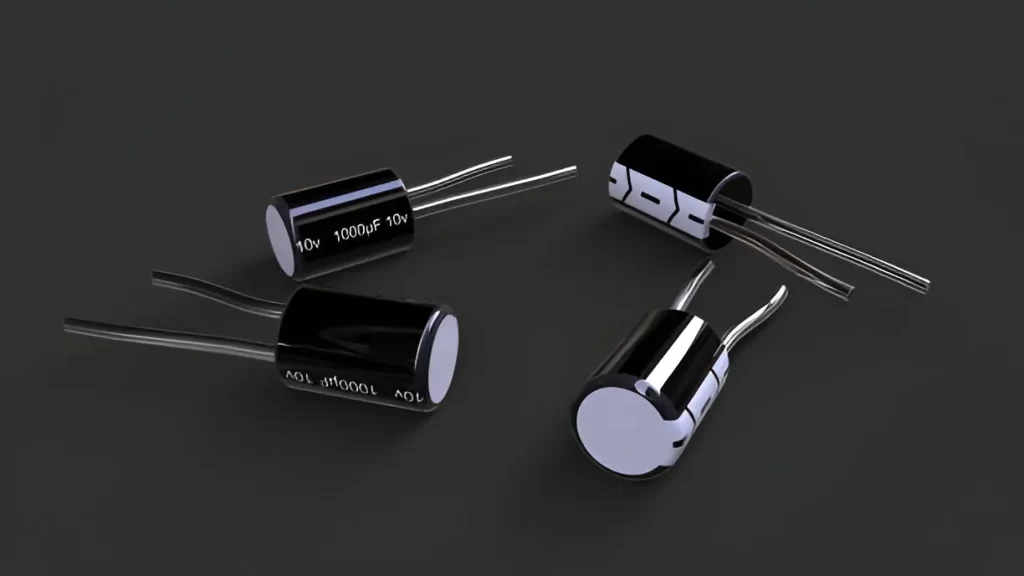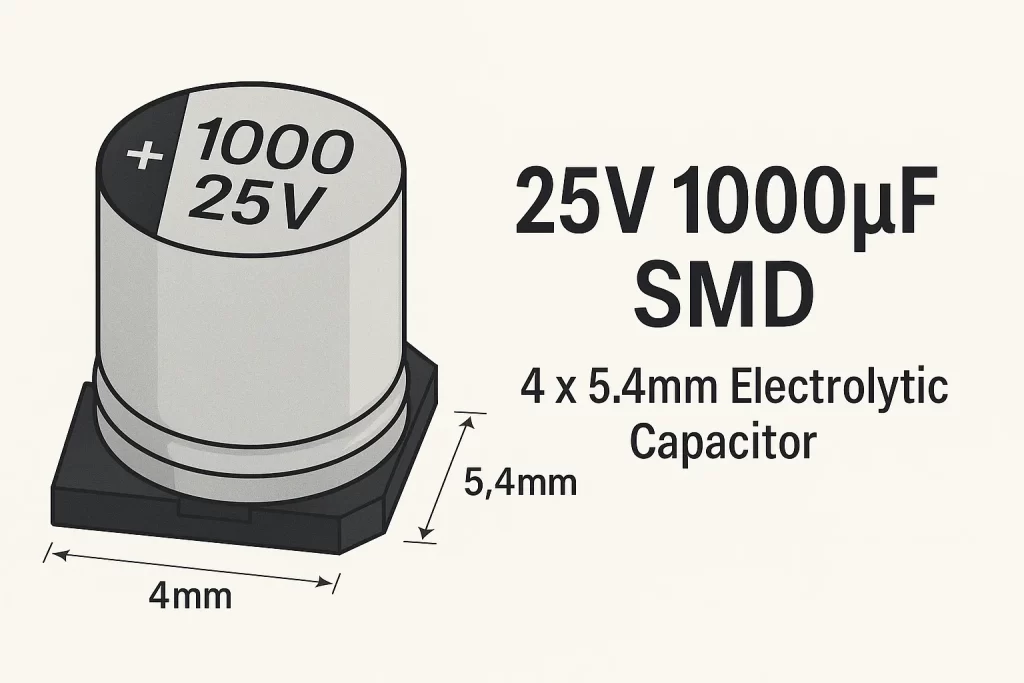Table of Contents
When designing compact and efficient circuits using KiCad, one of the most important considerations is selecting the right electrolytic capacitor for your board layout.
Among the popular choices for surface-mounted devices is the 25V 1000uF SMD electrolytic capacitor in a 4×5.4mm package.
This article serves as a comprehensive guide for electronics engineers and hobbyists looking to understand, source, and integrate this capacitor within KiCad efficiently.
What Is a 25V 1000uF SMD 4×5.4mm Electrolytic Capacitor?
A 25V 1000uF SMD electrolytic capacitor is a polarized component designed for high-capacitance storage, used to filter voltage, buffer power supply lines, or decouple AC signals. Here’s a quick breakdown of the label:
- 25V: Maximum voltage the capacitor can handle.
- 1000uF (microfarads): High capacitance to store electrical energy.
- SMD (Surface-Mount Device): Designed for PCB surface mounting.
- 4×5.4mm: The physical footprint is 4mm in diameter and 5.4mm in height.
Due to its compact size and high capacitance, it is an excellent choice for space-constrained designs requiring significant power buffering, like in DC-DC converters, microcontroller boards, IoT modules, and battery-powered devices.
Why Size Matters: 4×5.4mm Capacitor in Compact Designs?

Modern electronics demand miniaturization, meaning every millimeter counts on the PCB. A 4×5.4mm footprint makes this capacitor ideal for:
- Tight board layouts
- Slim-profile designs
- Dense power regulation circuits
Compared to taller capacitors, this form factor allows for horizontal mounting in low-clearance enclosures, without sacrificing performance.
How to Add a 25V 1000uF SMD Electrolytic Capacitor in KiCad?
KiCad, a powerful and open-source PCB design tool, allows for full customization of components. Here’s how to correctly integrate a 25V 1000uF SMD electrolytic capacitor in your KiCad design:
Choose the Correct Symbol
In KiCad’s Eeschema tool:
- Open your schematic.
- Use the “Add Symbol” tool.
- Search for:
CP(Polarized Capacitor) - Add and label it: 1000uF, 25V
Assign Footprint
After placing the symbol:
- Click “Assign Footprints”
- Search for:
Capacitor_SMD:C_Elec_4x5.4orCapacitor_SMD:C_Elec_4x5.4_RubberPad - Choose the one that matches your preferred soldering method.
Adjust Pad & Clearance Settings
To ensure DFM (Design for Manufacturing) compatibility:
- Maintain at least 0.2mm clearance between the pad and traces.
- Use thermal relief pads for proper soldering and heat dissipation.
3D Viewer Check
Use the 3D Viewer (Alt + 3) in KiCad to preview the mounted capacitor on your PCB. Ensure no interference with nearby components.
Read also: 185.63.253.2pp
Electrical Characteristics You Must Know
| Property | Value |
|---|---|
| Capacitance | 1000uF |
| Rated Voltage | 25V |
| Tolerance | ±20% (typical for electrolytics) |
| ESR (Equivalent Series Resistance) | ~0.1–0.5 ohm |
| Ripple Current | 150–300 mA |
| Leakage Current | ≤ 0.01CV or 3uA (after 2 mins) |
| Operating Temperature | -40°C to +105°C (depending on brand) |
| Life Expectancy | 1000–2000 hours @ 105°C |
These values can vary slightly depending on the brand or manufacturer (e.g., Panasonic, Nichicon, Rubycon, Lelon, etc.), so always consult the datasheet.
Where to Buy 25V 1000uF 4×5.4mm SMD Electrolytic Capacitors?
Recommended Distributors
- Digi-Key Electronics
- Mouser Electronics
- LCSC
- Arrow
- AliExpress (for prototyping only)
Look for models with low ESR, long life ratings, and verified footprints compatible with KiCad libraries.
Alternatives and When to Use Them
If the 4×5.4mm size is not available, consider:
| Alternate Size | Capacitance | Use Case |
|---|---|---|
| 6.3×7.7mm | 1000uF | More ripple current tolerance |
| 6.3×5.4mm | 680uF | If height is less critical |
| Tantalum 7343 | 470uF–1000uF | More stable but more expensive |
Tantalum capacitors may offer better performance in high-frequency applications but are polarized and fragile under surge conditions.
Best Practices for KiCad Footprint & PCB Design
Keep Polarity Clear
SMD electrolytics are polarized. In KiCad, mark the anode (positive) with a + sign on the silkscreen.
Avoid Via-in-Pad
For small capacitors like 4×5.4mm, avoid placing vias directly under the pads unless necessary. It can affect solder joint integrity.
Place Close to Load
Decoupling capacitors should be as close as possible to the power pins of ICs or regulators.
Group Power Filtering Caps
In power applications, combine the 1000uF with 100nF ceramics to smooth high-frequency noise.
Real-World Applications
- MCU Power Filtering: Smooth out voltage drops during peak loads.
- Battery-Powered Devices: Improve runtime by reducing ripple voltage.
- Switching Regulators: Stabilize input/output voltages.
- LED Drivers: Prevent flickering and current surges.
This capacitor is widely used in Arduino-based systems, ESP32 boards, Raspberry Pi hats, custom PCBs, and robotics modules.
Common Mistakes to Avoid
- Wrong footprint size: Always double-check the height (5.4mm) clearance in enclosures.
- Polarity reversal: This can lead to leakage, explosion, or capacitor failure.
- Under-rating voltage: Always select 25V or higher if your application voltage is 12V or above.
- Ignoring ESR: High ESR can lead to heat generation and reduced capacitor life.
Final Words
The 25V 1000uF SMD 4×5.4mm electrolytic capacitor is a powerful component for voltage smoothing and power regulation, especially in compact circuits. When paired with KiCad’s robust tools, you can integrate this capacitor into nearly any project with high confidence in reliability and efficiency.
Proper footprint selection, orientation, voltage matching, and ESR awareness are critical to ensure long-term performance and safety.






